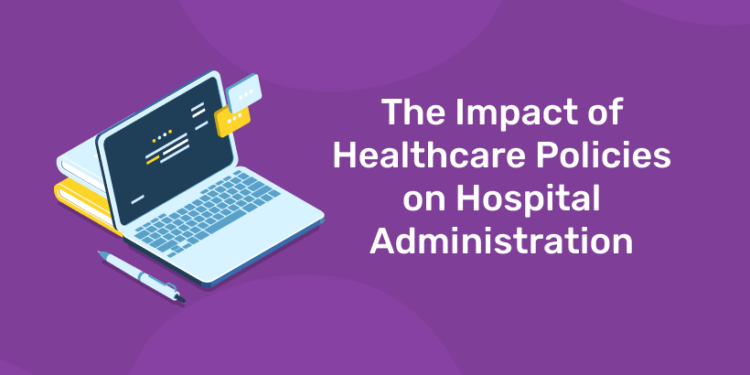Table of Contents
Healthcare policies are the foundation of the healthcare landscape, how hospitals operate, manage resources and deliver patient care. For hospital administrators, navigating these policies is a key part of their job as it affects every aspect of their work from financial management to staffing and from patient care standards to technology integration. This article looks at how changes in healthcare policies impact hospital administration and management.
Explore Your Future in Healthcare Management! Enroll now
Analyzing the Impact of Healthcare Policies
Financial Management and Budgeting
Healthcare policies have a big impact on hospital finances. Policies around reimbursement rates, funding and insurance coverage can directly impact a hospital’s revenue streams. For example changes in Medicaid and Medicare reimbursement can increase or decrease hospital income and require budgeting and financial planning adjustments. Good financial management means strategic resource allocation, cost control and continuous financial analysis to keep the hospital financially stable while delivering high quality care.
Hospital administrators need to develop financial strategies to adapt to these changes. This means forecasting financial impacts, creating flexible budgets and identifying alternative revenue streams. For example administrators can diversify income by expanding services, improving billing and increasing patient volume through community outreach and marketing.
Staffing and Workforce Management
Policies around staffing ratios, labor laws and healthcare worker qualifications impact how hospital administrators manage their workforce. Regulations around nurse to patient ratios or limits on working hours for medical staff require administrators to plan and schedule shifts to meet these standards while delivering optimal patient care.
Good workforce management means proactive recruitment, retention programs and continuous professional development for staff. Administrators need to stay up to date with changes in licensure requirements and labor laws to be compliant and avoid legal issues. Investing in staff well-being through wellness programs and fair labor practices can improve job satisfaction and reduce turnover and ultimately patient care.
Patient Care and Quality Standards
Healthcare policies set the standards for patient care, impact clinical practice and care protocols. Policies like the Affordable Care Act are all about value based care where hospitals are paid based on patient outcomes not volume of services. This means hospitals need to focus on improving patient outcomes, reducing readmissions and patient satisfaction.
Hospital administrators are key to implementing these policies by developing quality improvement programs, training clinical staff in best practice and continuous performance monitoring. By creating a culture of quality and safety administrators can ensure their hospital complies with policy standards and delivers high quality patient care.
Technology and Health IT
Policies around health information technology (IT) such as electronic health records (EHRs) and telehealth impact hospital administration. These technologies improve patient care by improving data accuracy, sharing information and remote care services. But implementing these systems requires significant investment in infrastructure, training and ongoing maintenance.
Legal and Regulatory Compliance
As a hospital administrator it’s a fundamental responsibility to comply with healthcare policies. Policies on patient privacy, data security, billing and clinical standards require strict adherence to avoid penalties and accreditation. Administrators must have a robust compliance program, conduct regular audits and provide ongoing training to staff to ensure all aspects of the hospital’s operations are compliant. By prioritizing compliance you can protect the hospital from legal risks and create an ethical culture.
Explore Your Future in Healthcare Management! Enroll now
Leadership and Policy Change
1: What is the primary role of a hospital administrator?
Strategic Planning and Policy Review
As a hospital administrator you must plan strategically to anticipate and respond to policy changes. This means analyzing policy impacts, risk assessing and developing contingency plans. You need to stay informed of legislative changes and be involved in policy discussions to advocate for the hospital’s interests. Strategic planning allows you to align the hospital’s goals with policy requirements so you are prepared for changes and operational stability.
Communication and Stakeholder Engagement
Communication with staff, patients and stakeholders is key when policy changes happen. Hospital administrators must communicate policy updates, explain the implications and outline what the hospital will do to comply. Engaging stakeholders in the process builds trust and collaboration so changes can be implemented and concerns addressed. Administrators should also seek feedback from staff and patients to identify issues and develop solutions to improve policy compliance and patient care.
Education and Training
Education is important for hospital administrators to stay up to date with changing healthcare policies and best practice. Registering for professional development courses, attending industry conferences can give the knowledge and skills to manage policy changes. For example Entri’s Hospital and Healthcare Administration Course covers healthcare management, policy analysis and leadership. By investing in themselves administrators can lead their organisations through complex policy environments.
Entri’s Hospital and Healthcare Administration Course
Entri’s Hospital and Healthcare Administration Course is designed to give healthcare leaders the knowledge and skills to navigate the complexities of healthcare management. The course covers policy analysis, financial management, quality improvement and strategic planning. Participants will get the latest healthcare policies and learn how to apply best practice to improve operational efficiency and patient care.
The course includes interactive modules, case studies and expert led sessions that provide practical real world insights. By registering for Entri’s course hospital administrators can manage policy changes, ensure compliance and lead their organization to success. The course is for current and aspiring hospital administrators looking to advance their career and make a difference in healthcare.
Hospital Administration Course with Assured Career Growth
Hospital Administration Course by Entri App: Master essential healthcare management skills, gain certification, and secure top roles in leading hospitals
Join Now!Conclusion
Healthcare policies affect hospital operations, financial management, staffing, patient care, technology and regulatory compliance. Hospital administrators need to be proactive in adapting to policy changes, planning and building a culture of compliance and quality improvement.
Continuous learning and professional development is key for administrators to stay updated on policy changes and leadership skills. Entri’s Hospital and Healthcare Administration Course provides training and insights to equip healthcare leaders with the tools. And knowledge to navigate the complexities of healthcare management.
By learning and staying updated on policy changes, hospital administrators can drive productivity, patient outcomes and lead their organisations to success. This way hospitals stay agile and able to deliver quality care in a changing healthcare environment.
Hospital Administration Course with Assured Career Growth
Hospital Administration Course by Entri App: Master essential healthcare management skills, gain certification, and secure top roles in leading hospitals
Join Now!Frequently Asked Questions
How do healthcare policies affect hospital administration?
Healthcare policies shape hospital administration by dictating compliance requirements, influencing financial management, and impacting patient care standards. Administrators must adapt to policy changes to ensure the hospital operates smoothly and meets legal and regulatory standards.
What are some common challenges hospital administrators face due to healthcare policies?
Common challenges include staying updated with frequent policy changes, managing budget constraints, ensuring staff compliance, and maintaining high-quality patient care amidst evolving regulations.
How can hospital administrators stay informed about healthcare policy changes?
Administrators can stay informed through continuous education, professional associations, subscribing to healthcare policy journals, attending relevant conferences, and engaging in professional networks.
What is the role of hospital administrators in implementing healthcare policies?
Hospital administrators are responsible for interpreting policies, implementing changes within their facilities, training staff, ensuring compliance, and monitoring the effectiveness of new policies to improve hospital operations.
How do healthcare policies impact hospital finances?
Policies can affect reimbursement rates, funding, and overall budget management. Administrators must navigate these financial implications to maintain the hospital’s financial health while providing quality care.












